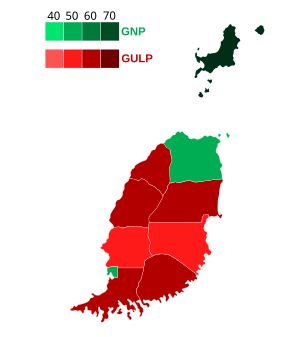| |||||||||||||||||||||||||||||||
All 10 seats in the House of Representatives 6 seats needed for a majority | |||||||||||||||||||||||||||||||
|---|---|---|---|---|---|---|---|---|---|---|---|---|---|---|---|---|---|---|---|---|---|---|---|---|---|---|---|---|---|---|---|
| |||||||||||||||||||||||||||||||
 Results by constituency | |||||||||||||||||||||||||||||||
| |||||||||||||||||||||||||||||||
 |
|---|
| Administrative divisions (parishes) |
General elections were held in Grenada on 24 August 1967. [1] The result was a victory for the Grenada United Labour Party, which won seven of the ten seats. Voter turnout was 77.1%. [2]

